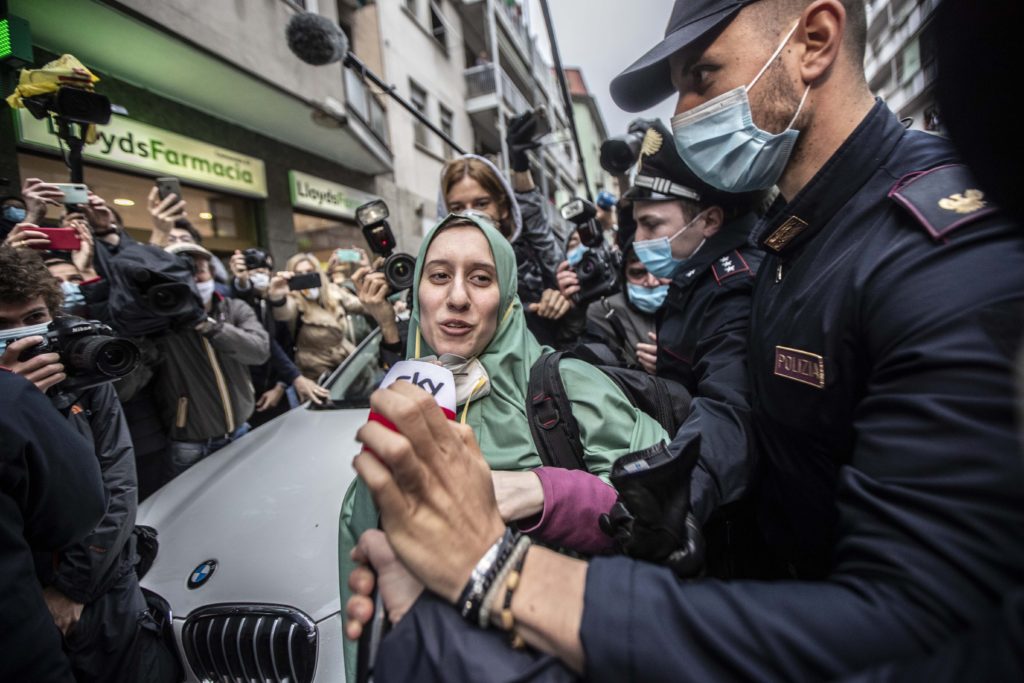The fact that she returned home in a hijab is cause for alarm, not an expression of freedom of religion.
By Fiamma Nirenstein, JNS
Silvia Romano, the Italian NGO volunteer who spent 18 months in captivity in Somalia, landed at Rome’s Ciampino airport on Sunday, dressed from head to toe in full Islamic garb.
The fact that the 25-year-old woman — who was abducted in November 2018 by Al-Shabab terrorists in Kenya, where she was working on behalf of the Italian charity, Africa Milele, at a local orphanage — returned home in a hijab is cause for alarm, not an expression of freedom of religion.
The radical Islamist world in which the kidnapped Italian girl was indoctrinated during her captivity is antithetical to the Western values on which she was raised. Its mantra boils down to placing death on a higher plane than life, and in subjugating women, non-Muslims and “apostates.”
“I have converted to Islam of my own free will,” Romano said upon disembarking her plane from Mogadishu.
This is doubtful. It is more plausible that “Stockholm Syndrome” is behind her becoming a Muslim. Being held captive for 536 days by Islamist terrorists will do that – particularly, perhaps, to idealistic youth from the West who travel to the Third World for “good causes,” and post photos of themselves surrounded by underprivileged children on social media.
Romano — whose release was obtained through painstaking efforts of the Italian and Turkish intelligence services and secured with a four-million-euro ransom — nevertheless defended her abductors. They treated her well, she said, while only slightly acknowledging their problematic practices in relation to women.
These involve subjecting the members of her gender to beatings and torture; turning them into sex slaves; and using them to provide offspring for “warriors” — proud mothers of terrorist children.
Shuttled across forests and dirt roads between Kenya and Somalia, in the hands of a pack of murderers — that the al-Shabab men certainly are — she might have married one of her kidnappers.
If so, he would be one of 7,000-9,000 members of the organization whose founding charter promotes such punishments as limb-amputation for robbery and stoning for adultery. It also sets as its goal the advent of global Islam — an aspiration for which they are willing to die and commit mass murder.
Indeed, Al-Shabab — that routinely recruits suicide terrorists for its missions — has perpetrated so many atrocities that it is impossible to list them all. But the few following examples that come to mind are sufficient to illustrate the group’s blood-lust.
These include: the October 2017 bombing in Mogadishu that left 500 dead; the January 2016 slaughter of 180-200 Kenyan soldiers at a military base in Somalia; the April 2015 massacre at the Garissa University College in Kenya, in which 148 mostly Christian students were killed; and the September 2013 attack on the Westgate shopping mall in Nairobi, which left 67 people dead.
It is not clear whether Italian Prime Minister Giuseppe Conte and Foreign Minister Luigi Di Maio were aware of Romano’s change of identity when they went to the airport to greet her and celebrate the victory of her release.
In any case, they should have been prepared with remarks to stave off the propaganda that the young woman spouted, either voluntarily or out of transformed stupidity.
Freedom of religion should not be a cloak for pernicious political ideologies. As an Italian citizen and a daughter of democracy, Romano has the right to convert — a right that would not be granted by radical Islamist regimes. But she and her supporters should remember that she was rescued by her country precisely because it is a free democracy.
Nor is the Islam of Al-Shabab merely a religion like any other. It belongs to “Dar al-Harb” (the house of war), rather than “Dar al-Islam” (the house of peace). In other words, it is the enemy of the values that Romano should hold dear.
Both Conte and Di Maio, then, should have reiterated the values in the name of which Romano was saved, not shy away from denouncing those responsible for her ordeal. Indeed, they should have announced that the latter have no place in Italy.
Their inability to do so demonstrates the way in which Western leaders do not really wish to confront terrorist Islam; they don’t even like uttering the words “Islam” and “terrorism” in the same breath.
As a result, Romano has become a vehicle for the wrong message. Rather than representing freedom from radical-Islamist bondage, she remains a tool for the spread of Al-Shabab propaganda that will resound across Europe. The lesson is that terrorism pays, both literally in the form of cash, and figuratively as a method.
Each smile flashed by a government official at the sight of Romano in a headscarf adds another wound to the heart of Western freedom.
Journalist Fiamma Nirenstein was a member of the Italian Parliament (2008-13), where she served as vice president of the Committee on Foreign Affairs in the Chamber of Deputies. A founding member of the international Friends of Israel Initiative, she has written 13 books, including “Israel Is Us” (2009). Currently, she is a fellow at the Jerusalem Center for Public Affairs.


